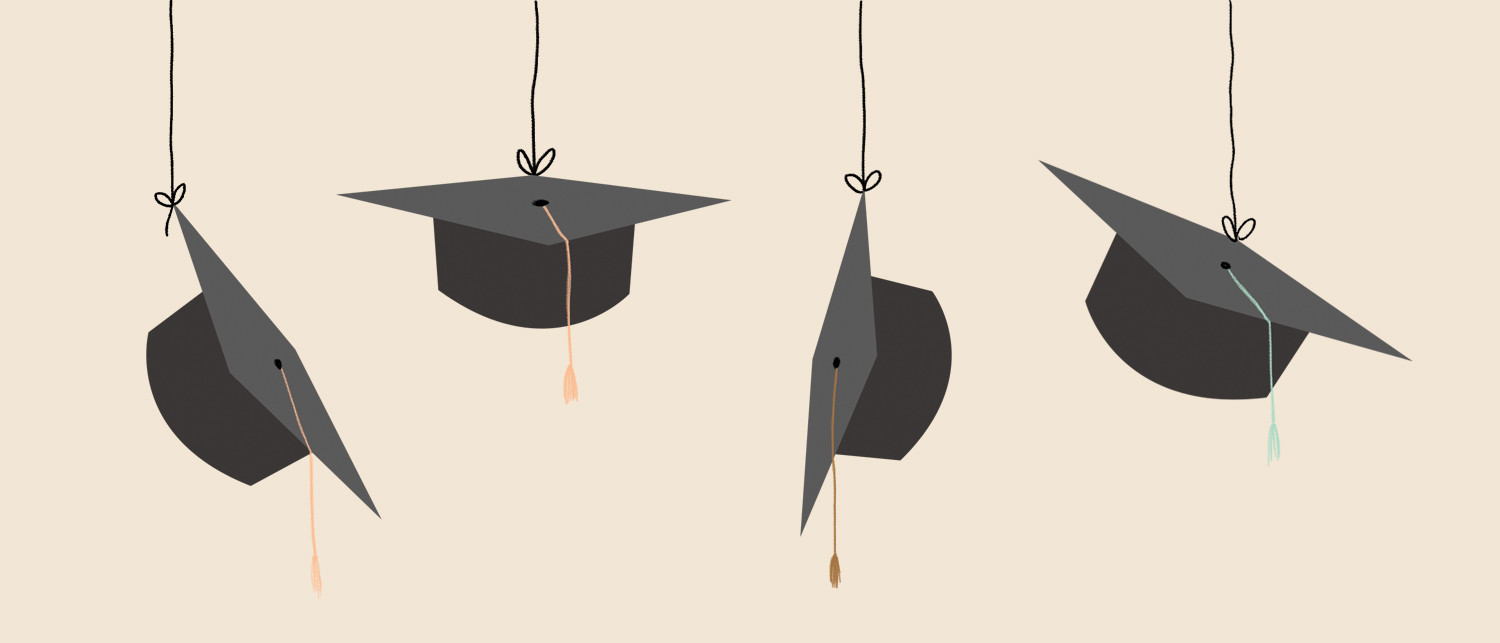The journey after graduation

Features Editor Bethany Bowles investigates whether or not an undergraduate degree is valuable on its own
 As the winter term reaches its midpoint, it’s becoming more and more evident that in two and a half months, I will com-plete my undergraduate degree.
As the winter term reaches its midpoint, it’s becoming more and more evident that in two and a half months, I will com-plete my undergraduate degree.
And I’m absolutely terrified.
As much as I know the last four years at Wilfrid Laurier University have helped my personal and intellectual growth, I can’t help but question what an employer could possibly see in me. I can’t help but automatically deem myself unem-ployable. When I look at the words “successfully obtained an Honours English degree” on my resume, I wonder how that looks to future employers.
Do they think all I can do is read and write? If there are jobs out there that require me to analyze Hamlet for a living, sign me up.
While I loved working hard to get my degree in a subject that I am passionate about, I find myself constantly staring at my line of credit, wondering if I will every be able to pay it off. I feel as if the only suitable answer is to get some form of higher education that makes my resume more impressive and more unique.
Like most university grads, I question what my next step is: do I let my undergraduate degree stand alone as my sole hiring feature, or do I seek a post-graduate program that could make me seem more attractive to employers?
A statistical perspective
Every year, the Career Centre at Laurier polls grads to see what they’re up to and the response rate is rather high. Out of all the students to graduate with an undergraduate degree in 2014, 84.9 per cent of them provided the Career Centre with useable data.
Of these graduates in, 61.4 per cent are employed in some way, 33.3 per cent are doing further education, 3.3 per cent are unemployed and two per cent chose “other,” which can include various things such as travelling, taking a year off or exploring alternative options.
The results are a mixture of all programs and faculties, which generalizes the results. They do, however break down these results by faculty, which helps to give more individualized data.
Of arts graduates in 2014, 49.8 per cent are employed, whereas 45.6 per cent sought further education.
In comparison, 83.5 per cent of business administration graduates from 2014 are employed, whereas 11.3 per cent sought further education.
Additionally, 31.3 per cent of science graduates from 2014 are employed, whereas 62.6 per cent sought further educa-tion. 37 per cent of music grads from 2014 are employed, whereas 58.9 per cent sought further education.
Finally and most outstanding, 95.7 per cent of graduates from the bachelor’s of education program from 2014 are em-ployed, whereas 1.1 per cent sought further education.
This can be daunting, but the decision to seek further education after obtaining an undergraduate degree is visibly cir-cumstantial. That decision depends on your program and your own vision of where you see yourself in the future.
A professor’s perspective
A master’s program always seemed so prestigiously daunting. Maybe that comes from a lack of understanding.
When looking at post-graduate programs, there are two popular routes. The first is to remain at the university level, which would be to go on and get a masters or graduate degree. The second popular option is to go to a college and ob-tain a post-graduate diploma or certificate.
Joan Norris, the dean of the faculty of graduate and postdoctoral studies at Laurier, described what she found to be the difference between the two routes. She explained colleges offer diplomas or certificates, often that require an under-graduate degree.
“But, they’re very skill based …They’re really focused on practical skills,” she said.
However a master’s degree, according to Norris, has a “blend of the applied and the practical,” as well as the theoreti-cal approach of university.
“[There’s] a lot more focus on either doing the research or becoming a very good consumer of the research.”
Norris undoubtedly spoke highly of Laurier’s graduate programs, but a master’s program is really only suited for stu-dents who are very much passionate about a specific subject.
“Even if you have a major as an undergraduate, you aren’t studying as intensely in one particular area as you would be in a master’s program,” Norris stated. “You take your interests, which were broader at the undergraduate level, and you focus them more at the master’s [level].”
A master’s program can also be daunting due to the price tag that comes with it. Norris explained while you do have to pay the tuition up front, research-based programs at Laurier offer funding for every student. In a mixture of scholarships and a bi-weekly salary for being a TA, this can amount to roughly $14,000 that the school is giving back to the student.
Norris also explained the employment possibilities for students who graduate with a master’s program are higher, but may not be better, and depend on the discipline.
“When an employer looks at your resume, or application letter, you would mention some of the things that you did during your graduate work. I think what an employer is going to notice is that you can think more independently, you can show more leadership in a position. They would just expect more of you.”
The Career Centre’s perspective
Laurier’s Career Centre has services students can use, including an entire component on what you can do with your degree.
Katherine St. Louis, manager of career resources and operations at the Career Centre, stressed the decision to go on to a post-graduate program is highly dependent on your individual situation. This question does not have a black and white answer, which is comforting yet stressful at the same time. She also expressed it’s a concern many students approaching graduation have.
“[Students ask] is my degree actually going to get me a job?” she said. “The short answer to that is most definitely, yes, but the qualifier in that is what kind of job you want.”
St. Louis said the decision to choose college or university after obtaining an undergraduate degree is highly dependent on the job you wish to have. For example, students interested in human resources can get a one-year post-graduate certificate from college and get an HR certification. While there are HR programs at the university level, the certificate is usually the popular choice.
“There certainly are fields where there is a more clear-cut answer,” she stated.
The narrowness of college programs shouldn’t deter students, however. College programs still teach students transferable skills.
“If you think you have an interest in an area, you’re going to find something in that certificate program or that master’s program that’s going to be helpful in your career,” she said. “Even if you don’t end up working directly in the industry or occupation that is connected to that educational program.”
Laurier has a wide range of differing faculties. Arts graduates and business graduates cannot be slotted into the same category. They graduate with varying skill sets. With business, St. Louis explained, the skills are more black and white, such as accounting or marketing. With arts, skills gained are referred to as soft skills, such as communicative skills or critical thinking.
After graduation, a business student can look at a job posting that requires accounting experience and know they are eligible to apply to that job. When an arts student looks at a job posting, they find themselves more confused as to what their skills are, which is why a lot of arts graduates seek further education.
“Arts students, I think, are well equipped. They might not have the programming or technical skills that a tech company might want, but they have the ability to think outside the box and to think critically and problem solve. Those are skills that tech firms need just as much as they need the technical skills,” she said.
She further explained most employers are looking for soft or transferable skills, like interpersonal skills or communication. Job-specific skills are trainable.
“The key is how you learn how to market yourself in your resume, your cover letters and then in interviews so that employers are able to interact with you and connect,” St. Louis said.
Altogether, having a stand-alone arts degree doesn’t make you unemployable, but if you don’t know how to market yourself, you won’t be as successful. There may be skills that you obtained during your undergraduate degree that you didn’t even know you had, and it’s important to understand what those are.
“You might have a different academic background, but the right skills and personality that the company is looking for,” St. Louis said.
Many of the professionals I spoke to couldn’t really provide a tangible answer. But the reality is, no one can tell you whether or not your undergraduate degree is good enough to stand alone.
St. Louis explained it’s hard to say where students will end up. A student may take a degree in one field, but end up in an entirely different career. But the tools are what remains constant.
“The reality is that people’s careers paths are really not very linear anymore … so it’s figuring out how to have the tools to know what about yourself drives your decision making, so you can make one decision,” she said. “You might do something for two, five, 10 years and then you say, I’m going to reinvent myself and I’m going to make a lateral move into a different industry, try a different job, try a different career, maybe go back into a certificate in five years … careers paths look more [scattered] rather than in a straight line. The way you manage that yourself is the process of knowing yourself.”
Graduating students need to take a second and step back from the stress. Step back from your parents asking what your plan is for the future. Look away from your friends who are anxiously applying to grad school. Avoid the booths in the Concourse shoving their brochures down your throat. Just take a moment and congratulate yourself for graduating university.
You don’t have to make a decision right away. If you don’t know if you should pursue a post-graduate education, that’s okay.


